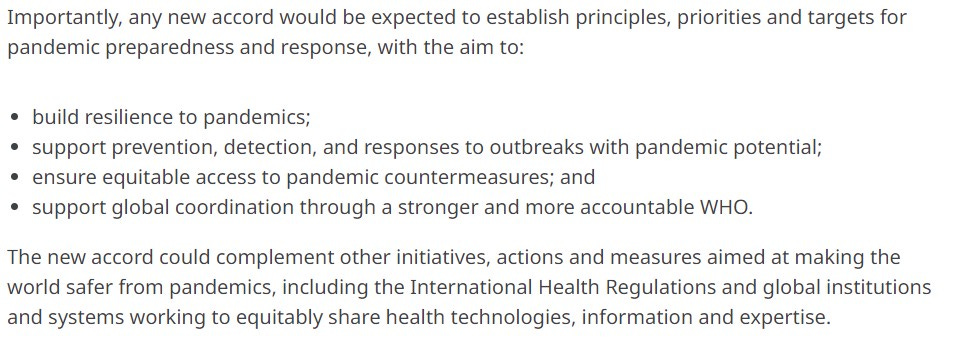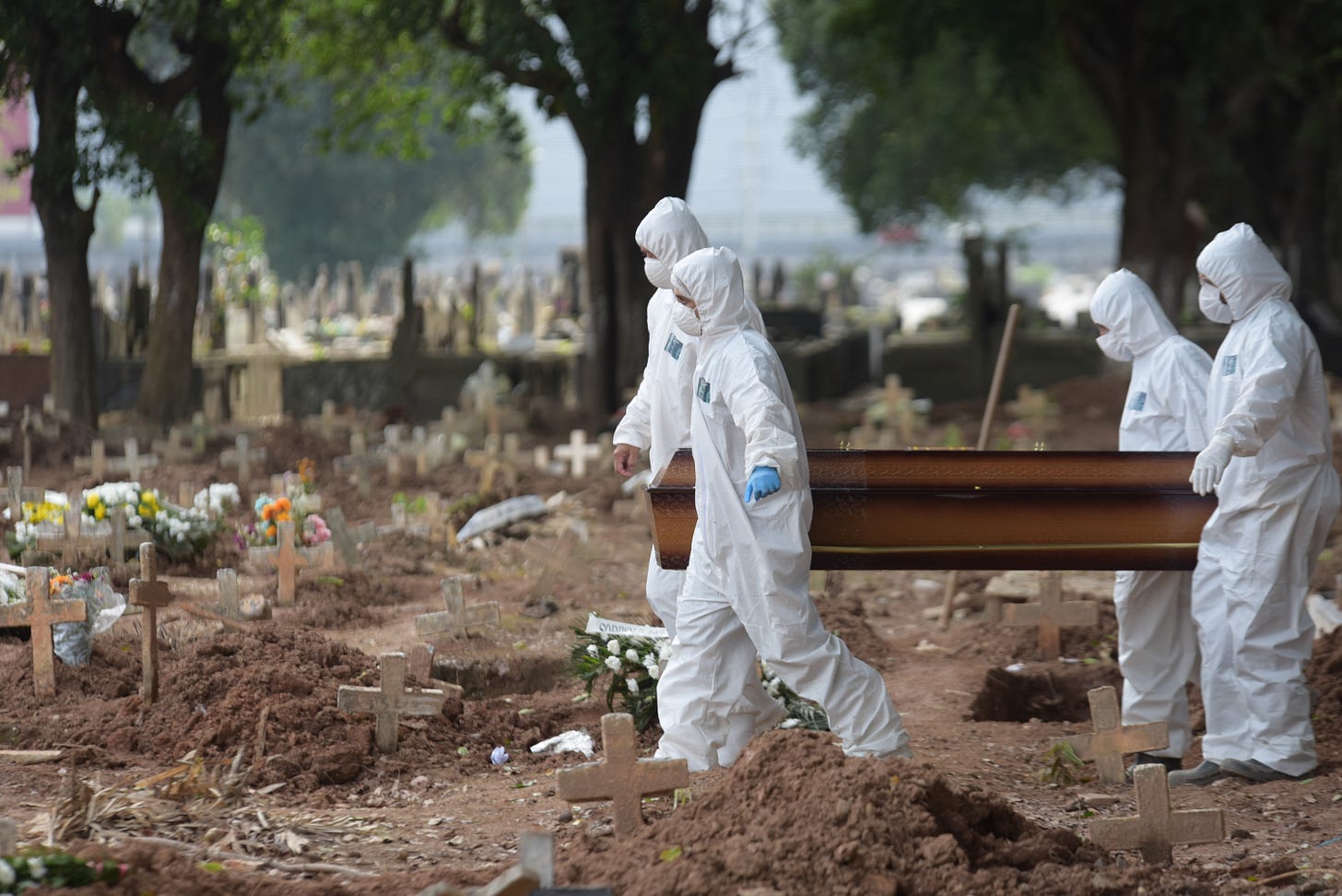WHO do you Think you Are?
The World Health Organization makes a power grab for a global pandemic agency
Never let a good crisis go to waste.
Whether it was Machiavelli or Churchill who first made this claim, it is a sign of astute leadership to turn a crisis into an opportunity. Poor leadership, however, would reveal to all their crass opportunism of using a crisis for their advantage. Such is the case with the WHO and their plan to expand by establishing a global pandemic body via the Pandemic Prevention, Preparedness and Response Accord.
The “Accord” seeks to create a binding legal agreement for all WHO member states giving the UN body increased powers to make decisions during any future global pandemic. This includes setting policies on travel, vaccine and PPE access, resource sharing and access to expertise. It hopes to set international health regulations during future pandemics.
See the WHO’s Q&A:
Some points in the WHO draft documents seem to be left intentionally vague. How would an international health body build resilience to pandemics? How would equitable access to pandemic countermeasures be defined? Would PPE, healthcare and vaccine producers be expected to allow the WHO to determine who has rights to their products? How will some proposed WHO Global Supply Chain and Logistics Network’s actions be enforced? What is not vague is that the WHO is intent on increasing its power, scope and budget and they are attracting opportunist actors like cats at a fish market.
The undertone in the WHO’s stated objectives is to ensure equity and social justice during pandemics. The terms ‘equity’ and ‘inequity’ appear 28 times in the latest draft accord. Now it doesn’t take much to realise that those less fortunate (geographically, economically and genetically) suffer more health injustices and as the last pandemic revealed, the burden fell more heavily on those in society with the least opportunities. But unless the WHO is planning a massive global redistribution of wealth, it is not clear how exactly they will be able to address this problem. The Accord lays out more of a socio-economic strategy than a health one. The draft text talks about the need for clean drinking water and addressing “disparities, inequalities, discrimination, stigma and bias”… but without giving any clear roadmaps.
There have been a lot of reactions against this proposed pandemic accord (which in the last month were curiously removed from my Google search results). The WHO even got one of their lawyers to give some lowball responses (quite poorly) to some of the more extreme conspiracy theories.
Most of the reasonable concerns relate to fears of global governments and loss of political and individual rights to some unelected, unaccountable body. True, but in our technocratic society, governed more by algorithms than humans, this is happening on a regular basis. I am more concerned about the quality and intelligence of those decision-makers and experts stepping forward in a time of crisis.
A History of Poor Leadership
Would we really want WHO civil servants making decisions for us during another health pandemic? Granted, the leadership that brought much of the Western world into 18 months of stifling lockdowns was woeful, but they shine in comparison to the WHO’s pathetic corral of leaders.
Recall that one of Tedros Ghebreyesus’ first decisions as head of the WHO was to nominate Zimbabwean dictator and serial human rights violator, Robert Mugabe, as a WHO goodwill ambassador.
This was in keeping with the erratic and tragic trainwreck of the tenure of the WHO’s previous head, Margaret Chan, who trademarked the term “incompetence” during the various Ebola and Swine Flu outbreaks.
IARC (International Agency for Research on Cancer) is part of the WHO and not once in that cancer agency’s tumultuous history of abuse of politically-poisoned scientific methodologies has the WHO tried to rein those activists in.
And who could forget the WHO hosting a global conference on alternative and traditional medicines in 2023? So to keep everyone in the big tent happy, I suppose ivermectin won’t be rejected in future as an anti-viral.
And now we are just supposed to sit back and let these people make decisions on our health and safety during a serious health crisis. Hmm.
What’s worse is the inherent and relentless bias purveying the WHO that would inhibit the organization from doing an effective job in the case of a future pandemic. At the height of COVID-19, for example, the Canadian government funded research into Covifenz, a plant-based vaccine it then approved for use in preventing the spread of the coronavirus. One of the strongest advantages of Covifenz was that it could be easily and cheaply produced and distributed without the need for cold chain storage technologies, thus perfect for use in developing countries and rural regions. The WHO refused to accept the vaccine for emergency use in 2022, when vaccines in developing countries were in desperate need, solely on the basis that the tobacco company, Philip Morris, was an initial funder and was involved in research and development of this nicotine-derived vaccine. Would we really want to give more power at a time of a health crisis to an organization that speaks so highly of equity but then acts so disgracefully when lives are at risk?
One Health (We’re All in this Together!)
The WHO has a One Health Initiative to try to reduce fragmentation in managing health according to our shared ecological systems affecting human and animal health and other challenges (like climate change that they declared at COP28 in Dubai to be a major global health risk). This ideology considers health issues as holistic and interconnected on a global scale between humans, animals and the planet. The latest draft accord pushes this initiative, stating that we need: “… the One Health approach for pandemic prevention, preparedness and response that is coherent, comprehensive, integrated, coordinated and collaborative among relevant actors and sectors.” So they suppose some global pandemic body can work in unison on all issues with all countries acting together at the same levels.
What strikes me here is how little the WHO actually understands about the nature of public health management. Like diets and culture, health issues vary at the local level. Priorities, resilience and objectives are so regionally diverse that any homogenization efforts would be doomed to fail, or at best be ignored. This was evident in how different countries and regions reacted (or were allowed to react) to COVID-19. Developing countries in Africa were more resilient than advanced Western economies, California and Florida were too politically and culturally diverse to implement the same pandemic response strategies and countries with high levels of privacy and data protection were legally unable to impose track and trace measures that succeeded in countries like Singapore and South Korea. How would a global pandemic agency insisting on hammering everything into its ideological box be able to add any value at the supranational level?
Another concern is how the WHO frequently likened their future role as the Global Pandemic Police to their actions in the Framework Convention on Tobacco Control (FTCT). This is part of the WHO’s trend in recent decades toward concentrating more on setting policies on non-communicable diseases (thanks to financial support from rent-seeking interest groups like Bloomberg Philanthropies no doubt). One can imagine a mission creep at the proposed WHO pandemic body from determining the best available science on some viral outbreak to one of controlling the movements and freedoms of populations. Dictating policies to control individuals’ lifestyle practices is so much more rewarding so it would not be surprising to see a trigger-happy pandemic agency be quick to impose international lockdowns. Perhaps during this next lockdown we will also see the FCTC imposing international health regulations on smoking (because, well, One Health).
In short, giving the WHO increased funding to harmonize a global response would be a waste of money. Giving the WHO the power to make decisions over the voices of national governments or free markets would create nothing but outrage and confusing public disagreements. The Pandemic Prevention, Preparedness and Response Accord is crass opportunism that only the most foolish national leaders would sign onto.
An Unstoppable Process
But it’s already too late for reason or dialogue.
Next month (May, 2024), at the WHO’s 77th World Health Assembly, the 194 international delegates will finalize this global pandemic Accord, budgets will be allocated from the participating member states, offices set up in some designated country (with good restaurants and air links) and some Pandemic Czar nominated. Many delegates will salute the convention’s fine work but then their country will not sign onto the agreement. It is not in the nature of international diplomacy for anyone at any high-level conference to stand up and declare: This is a colossally stupid idea!
Unfortunately, these international processes have been set up in such a methodical way that, once started, they are impossible to stop or influence. At INB9 last month, the final preparatory meeting before the plenary votes, most of the contributions were from activist groups demanding the accord stress more equity and less charity. The UN is too often guided by groups who can afford to take ten days to attend a conference in Geneva. INB9, by the way, stands for: the Ninth Meeting of the Intergovernmental Negotiating Body to Draft and Negotiate a WHO Convention, Agreement or Other International Instrument on Pandemic Prevention, Preparedness and Response. The rest of the world is sleeping while these crass opportunists pad out their futures … and we are left to pay for them. Money for nothing.
After the conference, the new WHO pandemic body will be given some indecipherable acronym, recline into the background, have a few conferences, publish some monographs that a few virologists will comment on and then be largely forgotten. In the event of a further global pandemic, some activists and media will rediscover them, but their advice will be overshadowed, as expected, by the interests of national politicians and ambitious health administrators.
Making a difference and saving lives was never the goal of the Pandemic Prevention, Preparedness and Response Accord. It was all about growing the WHO with a new agency and a greater budget. Anything more would be overreach beyond an international government’s remit or capacity.
This is a colossally stupid idea!




